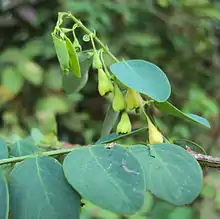Breynia retusa
Breynia retusa is a species of plant in the family Phyllanthaceae.
| Breynia retusa | |
|---|---|
 | |
| Scientific classification | |
| Kingdom: | Plantae |
| Clade: | Tracheophytes |
| Clade: | Angiosperms |
| Clade: | Eudicots |
| Clade: | Rosids |
| Order: | Malpighiales |
| Family: | Phyllanthaceae |
| Genus: | Breynia |
| Species: | B. retusa |
| Binomial name | |
| Breynia retusa (Dennst.) Alston | |
| Synonyms[1] | |
| |
Distribution
It grows naturally in Bangladesh,[2] China,[3] Bhutan, Cambodia, India, Laos, Malaysia (peninsular), Myanmar, Nepal, Sri Lanka, Thailand, Vietnam[4] and Réunion where it is considered as an invasive weed.[5]
The synonysation of Sauropus elegantissimus that is known to be endemic to Malaysia is disputed. Under this name, this plant is listed as critically endangered,[6] but it is unclear what effect an updated taxonomy would have on that rating.
References
- "Breynia retusa (Dennst.) Alston". The Plant List. Retrieved 31 March 2014.
- Shaikh Bokhtear Uddin. "Medicinal Plants of Bangladesh". Archived from the original on 7 April 2014. Retrieved 3 April 2014.
- www.tropicos.org
- Bingtao Li and Hans-Joachim Esser. "Breynia retusa". Flora of China. 11.
- www.especesinvasives.re Groupe Espèces Invasives de La Réunion
- World Conservation Monitoring Centre (1998). "Sauropus elegantissimus". The IUCN Red List of Threatened Species. IUCN. 1998: e.T31491A9632844. doi:10.2305/IUCN.UK.1998.RLTS.T31491A9632844.en. Retrieved 10 January 2018.
| Wikimedia Commons has media related to Breynia retusa. |
This article is issued from Wikipedia. The text is licensed under Creative Commons - Attribution - Sharealike. Additional terms may apply for the media files.